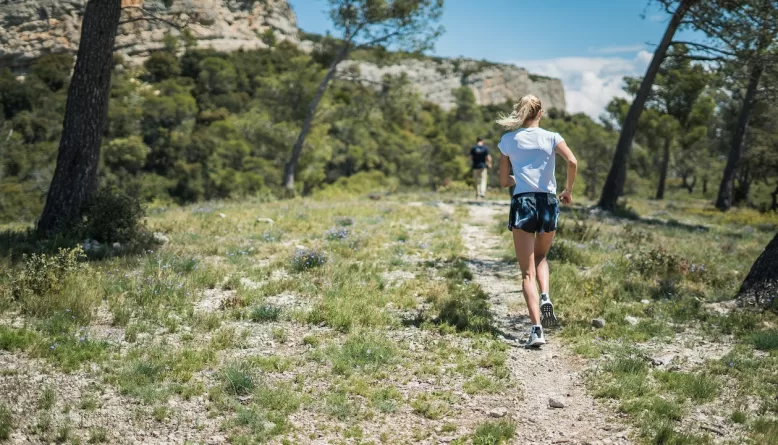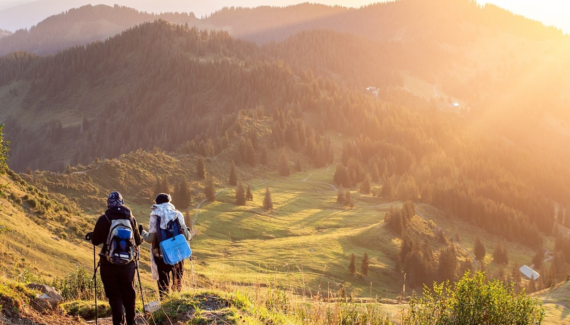Introduction:
In the modern world, where stress and anxiety often take center stage, finding effective ways to maintain mental well-being is crucial. One such method that has gained widespread recognition is hiking. Beyond physical exercise, hiking offers a plethora of psychological benefits that contribute to a healthier mind. In this in-depth guide, we delve into the remarkable ways in which hiking can enhance mental health and overall well-being.
Table of Contents
The Therapeutic Nature of Nature:
Hiking’s Connection to Nature’s Tranquility
Picture this: lush green trails, a gentle breeze rustling through leaves, and the soothing sounds of birdsong. Such scenes are not just picturesque but also inherently therapeutic. Spending time in nature, like hiking through serene landscapes, has been linked to reduced stress levels, increased relaxation, and an overall sense of well-being. The interplay between the natural world and our mental state is a harmonious one, offering a much-needed escape from the hustle and bustle of daily life.
LSI Keyword: Nature therapy for mental health
The Science Behind the Serotonin Surge:
Hiking’s Impact on Mood and Happiness
Ever experienced that euphoric feeling after a hike? You’re not alone. Engaging in physical activities, like hiking, triggers the release of endorphins and serotonin, often referred to as the “feel-good” hormones. These chemical messengers play a significant role in regulating mood and promoting a sense of happiness. As your feet hit the trail, your brain responds with a surge of positivity, leaving you in a better mental state.
LSI Keyword: Hiking and serotonin production
Mindfulness in Every Step:
Hiking as a Form of Meditation
Mindfulness is a mental practice that involves being fully present in the moment. Hiking, with its rhythmic pace and ever-changing surroundings, naturally encourages mindfulness. As you navigate the terrain, your focus shifts from daily worries to the sensations of the present. The act of observing the path, feeling the ground beneath your feet, and breathing in the fresh air cultivates a state of mindfulness akin to meditation, promoting mental clarity and reducing anxiety.
LSI Keyword: Mindful hiking for stress relief
Social Connections on the Summit:
Fostering Relationships and Community
Hiking need not be a solitary endeavor. It presents an excellent opportunity to connect with like-minded individuals, whether it’s joining a local hiking group or embarking on a trail with friends and family. These shared experiences create bonds, strengthen relationships, and provide a sense of belonging. The camaraderie and support found within hiking communities contribute positively to mental well-being.
LSI Keyword: Hiking groups and social well-being
Overcoming Mental Barriers:
Boosting Confidence and Self-Efficacy
Conquering a challenging trail or reaching a breathtaking viewpoint instills a sense of accomplishment that transcends the physical realm. Hiking pushes you out of your comfort zone, teaching you resilience, determination, and self-reliance. As you overcome obstacles on the trail, you develop a newfound confidence that extends to various aspects of life. This bolstered self-efficacy can be a powerful tool in managing stress and anxiety.
LSI Keyword: Hiking and personal growth
Unplugging for Mental Restoration:
Digital Detox and Stress Reduction
In an era dominated by screens and constant connectivity, hiking offers a much-needed break from digital distractions. Disconnecting from technology during a hike allows your mind to recharge and reset. The absence of notifications and alerts provides space for introspection, reducing stress levels and promoting mental clarity. Hiking becomes a digital detox, offering a respite from the constant influx of information.
LSI Keyword: Hiking and technology detox
Harnessing the Healing Power of Green:
Nature’s Impact on Reducing Depression
Research suggests that exposure to nature, especially lush green landscapes, can significantly reduce symptoms of depression. Hiking amidst natural surroundings provides a sensory feast that stimulates the brain’s reward system. The visual feast of vibrant greens and the invigorating scents of the outdoors contribute to a more positive mental state, offering relief from the grip of depressive thoughts.
LSI Keyword: Green spaces and depression relief
From Struggle to Strength:
Hiking as a Coping Mechanism
Life’s challenges often lead to stress, anxiety, and even depression. Hiking can serve as a constructive coping mechanism during difficult times. Physical activity, coupled with the tranquility of nature, helps alleviate emotional distress. Engaging in hiking redirects focus, enabling you to process emotions, gain perspective, and find solace amidst the beauty of the natural world.
LSI Keyword: Hiking for emotional coping
A Breath of Fresh Air for Cognitive Function:
Hiking’s Impact on Cognitive Abilities
The benefits of hiking extend beyond mood enhancement. Studies indicate that spending time outdoors can improve cognitive function. The combination of physical activity and exposure to nature sharpens focus, enhances problem-solving skills, and boosts creativity. Whether you’re navigating trails or taking in scenic vistas, hiking engages your brain in ways that support mental agility.
LSI Keyword: Cognitive benefits of hiking
Beyond Stress: Hiking and Anxiety Reduction:
Nature’s Role in Soothing Anxious Minds
Anxiety can be all-consuming, affecting every aspect of life. Hiking offers a reprieve from the grip of anxiety by creating a serene environment that calms the mind. The rhythmic movement, fresh air, and sensory experiences provide a multi-faceted approach to anxiety reduction. Nature’s embrace acts as a gentle balm, soothing anxious thoughts and promoting a sense of tranquility.
LSI Keyword: Hiking for anxiety relief
Finding Balance through Hiking:
Hiking’s Role in Stress Management
Stress is an inevitable part of modern living, but managing it effectively is within reach. Hiking provides a holistic approach to stress management. Engaging in physical activity triggers the release of tension while the immersive experience of nature combats stress on a psychological level. The interplay of movement and mindfulness found in hiking equips individuals with potent tools to navigate life’s challenges.
LSI Keyword: Hiking for stress management
Related Article: Stay Comfy and Confident: What to Wear on Your Next Hiking Expedition
Unlocking the Fountain of Creativity:
Hiking’s Influence on Artistic Expression
For creative minds, hiking can be a wellspring of inspiration. The natural beauty encountered on hikes stimulates artistic expression and fuels creative thinking. Writers, painters, and musicians often find their creativity ignited by the sights, sounds, and textures of the great outdoors. Hiking becomes a catalyst for exploring new ideas and breathing life into artistic endeavors.
LSI Keyword: Hiking and artistic inspiration
Nature’s Antidote to Urban Fatigue:
Hiking’s Impact on Mental Restoration
Urban living can be taxing on mental health, leading to urban fatigue and burnout. Hiking offers a retreat from the urban hustle, providing a much-needed escape to tranquility. The symbiotic relationship between nature and mental restoration is evident as the mind unwinds amidst natural splendor. Hiking’s ability to rejuvenate the mind makes it a potent remedy for urban fatigue.
LSI Keyword: Hiking and urban fatigue relief
FAQs – Answering Your Queries:
Q: Can hiking replace traditional forms of therapy for mental health?
A: While hiking offers numerous psychological benefits, it’s important to consult a mental health professional for serious conditions. Hiking can complement therapy but should not replace it.
Q: How often should I hike to experience noticeable improvements in mental well-being?
A: Regular hiking, even once a week, can lead to positive changes in mood and overall mental health. Consistency is key to reaping the benefits.
Q: Can beginners with limited physical fitness engage in hiking for mental health benefits?
A: Absolutely! Start with easy trails and gradually increase difficulty. Hiking is adaptable to various fitness levels and can be tailored to individual capabilities.
Q: What safety precautions should I take while hiking for mental health?
A: Prioritize safety by wearing appropriate footwear, carrying essentials like water and a first aid kit, informing someone of your hiking plans, and staying on marked trails.
Q: Can I experience the psychological benefits of hiking even in urban or suburban settings?
A: Yes, urban and suburban areas often have parks and nature reserves that offer similar benefits. Spending time in green spaces can still positively impact mental well-being.
Q: Are there specific mindfulness techniques I can practice while hiking?
A: Absolutely. Focus on your breathing, engage your senses in the present moment, and observe the details of your surroundings to practice mindfulness while hiking.
Conclusion:
In a world filled with constant demands and pressures, prioritizing mental well-being is a necessity. Hiking, with its profound psychological benefits, emerges as a natural remedy that harmonizes mind and nature. From reducing stress and anxiety to fostering social connections and boosting self-confidence, hiking enriches our lives on multiple fronts. As you embark on trails that wind through stunning landscapes, remember that the journey isn’t solely physical – it’s a transformative experience that nurtures the soul.
Related Article: 10 Hiking Benefits: Exploring Nature for Mind, Body, and Spirit



No Responses Yet